


Devereux Unaccompanied Children’s Services Program
Welcome Book Helping You Reunify with Your Family The
Welcome to the Devereux Unaccompanied Children’s Services Program. The goal of this program is to help you while we find your family members, or people who you can live with in the community, where you will be safe and comfortable.
This book will help you understand what to expect while you are here. It will also help you learn about our rules.

We want to help make your stay here the best it can be. You are safe with us.
We are happy that you are here!
2
¡Bienvenido!
Welcome!
3
Contents Introduction & Your First Meeting Schedule Page 4 Your Rights Page 5 -6 Title IX Policies and Procedures Page 6-7 Rules Page 8 Who is Who Page 9 During Your Stay Page 10 Meetings Page 11 Daily Rules Page 12 Bedroom Rules Page 13 Bathing & Personal Care Page 14 Allowable and Unallowable Items Page 15 Safety Page 16 Healthy Boundaries Page 17 What to Do If You Have a Problem Page 18 Important Information and Phone Numbers Page 19-20 Legal Services Page 21 Welcome Book Acknowledgement Sheet Page 22
Table of
Introduction
Welcome to the Devereux Unaccompanied Children’s Services Program. An easier way to understand this is that it is a place for children who have been separated from their families and given help to find their families, relatives or new friends in the community (they are called “sponsors”) who are willing to have you come join their family.
When you first come here, you might feel confused, sad, or even scared. You probably have many questions about how long you will be here, where you will be going next and when you can call your family. This Welcome Book has been made to answer your questions.
At this program, the people who work here (they are called “staff”) are here to care for you and to provide for your needs, like food, housing and clothes. You will also be given medical care,counseling, schooling and ideas for fun things to do! Our staff are available to help you with finding possible sponsors and possibly your family.
When you first come to this program, our staff will be there welcome you and help you with the paperwork to enter the program. This is called “admissions”. First, you will be told about your Rights and the Rules when you come in to our care. You will also be given the program's “Grievance Policy”, which are the steps you should follow if you have a problem or concern while you are here. Then you will be shown to your room (called a “residence”) and you will be given a meal, allowed to take a shower and then given the chance to make phone calls to your family. After finishing this, you will then be taken to the nursing department to receive a medical check-up.
Your First Meeting Schedule
During the first 5 days of your stay in the program, the following meetings will be scheduled for you:
Meet your Case Manager (a person who is here to help you with finding the help you need while you are staying with us) and staff to do program paperwork.
Meet with a Nurse to do your first medical checks.
Meet with a Program Doctor to do a medical physical and get referrals for other medical services you may need.
Meet with your Case Manager to start finding a sponsor and your family.
Meet with your counselor for mental health screening.
Meet with school staff to talk about schooling.
4
Your Rights
In this program, you have the right:
To be taken care of with good living and sleeping spaces, food, clothing and personal care items
To be given standard medical and dental care, family planning services, emergency health care services, (including a full medical check within the first two days you arrive including screenings for infectious disease – or diseases and infections you may have picked up from germs- within 48 hours of admission), any prescription medications and special diets you need, and mental health therapy and treatments if needed
To be given help with the paperwork to fill out to help get the important information about your family, help with any special needs, help making a school plan, help with your religion and church practice if important to you; a list of your personal goals, strengths and challenges; and help to find your family members, other relatives, godparents or friends who may be living in the United States
To be given school services that are right for your age and skills in a classroom setting Monday-Friday, that will include teaching, schoolwork, supplies and books in the language you need to learn
To be given fun indoor and outdoor activities including exercise, television and time spent playing with other children
To have at least one counseling session each week in a safe space for you to talk about how you feel and how things are going
To have counseling sessions at least twice a week in a group with some of the other children to help you make friends, understand rules and get to know the staff better
To be given help adapting to your new living space and friends, including help to give you the ability to live on your own safely when you are ready in the future
To be given a full written and spoken summary of the program, including the rules, goals and a list of our services that can help you
To be given the ability to go to a church or religious service of your belief when possible
To contact and visit with family members (regardless of their immigration status), where the staff will respect your privacy with the visit within the rules of the program
To have a reasonable right to privacy, which includes the right to wear your own clothes when possible, to have a private space while you stay here, to talk
5
privately on the phone and visit privately with guests (within the program rules and regulations), receive and send mail that doesn’t contain prohibited items
To services that help identify and find family and relatives in the United States as well as in foreign countries, and with assistance in legal guardianship when appropriate
To legal services information and resources, including free legal assistance, and to have an attorney (at no expense), as well as the right to a removal hearing before an immigration judge, the right to apply for asylum (meaning protection and safety) or to ask to leave on your own instead of deportation. You will be given a Know Your Rights presentation during your orientation, it will explain all of your legal rights
To contact your consulate of your country within the first two days of coming to this program
Title IX Policy and Procedures
What is Title IX?
Title IX of the Education Amendments of 1972 (“Title IX”) prohibits discrimination on the basis of sex in any federally funded education program or activity. Sex discrimination includes sex-based harassment, discrimination on the basis of sex, and retaliation related to complaints of sex discrimination. Sex-based harassment is unwelcome conduct which includes both sexual harassment, including but not limited to sexual assault, other forms of sexual violence and other sexual misconduct, and gender-based harassment. This applies to academic, educational, athletic, and residential programs.
What is Different?
The new Title IX regulation holds schools accountable for failure to respond equitably and promptly to sexual misconduct incidents and ensures a more reliable adjudication process that is fair to all students. The Final Regulations specify how recipients (defined as schools, LEAs, postsecondary institutions) of federal financial assistance must respond to allegations of sexual harassment consistent with Title IX’s prohibition against sex discrimination. They further specify how recipients (defined as schools, LEAs, postsecondary institutions) of federal financial assistance must respond to allegations of sexual harassment consistent with Title IX’s prohibition against sex discrimination.
Under Title IX, you have the right:
To receive services free from discrimination on the basis of sex. Sex discrimination can include sex-based harassment, discrimination on the basis of sex, and retaliation related to complaints of sex discrimination. Sex-based harassment is unwelcome conduct which includes both sexual harassment, sexual assault, other forms of sexual violence and other sexual misconduct, and gender-based harassment. If you are a
6
victim of sexual misconduct, you have the right to receive access to a fair and reliable legal process.
Title IX Coordinator:
Name: Morgan Fulks
Phone Number: (860) 868-7377
Email: mfulks2@devereux.org
Address: 81 Sabbaday Lane, Washington, CT 06793
Title IX Investigator:
Name: Justin Mazzucco
Phone Number: (860) 868-7377
Email: jmazzucc@devereux.org
Address: 81 Sabbaday Lane, Washington, CT 06793
Title IX Decision Maker:
Name: Noah Noyes
Phone Number: (860) 868-7377
Email: nnoyes@devereux.org
Address: 81 Sabbaday Lane, Washington, CT 06793
Title IX Appeals Coordinator:
Name: Jacalyn Auris
Phone Number: 484-947-1099
Email: jauris@devereux.org
7
Rules
Be kind to each other
Respect each other
Use nice language
Speak softly – no yelling
Go to school everyday
Do homework before dinnertime
Wear play clothes for outdoor playtime
Wear only your clothes
Do your chores every day
Do not go in another child’s bedroom
Do not eat or drink in your bedroom
Do not go into an office unless you are with a staff person
No bullying or picking on each other
No fighting or pretend fighting
Clean your room
Make your bed every day
Leave your bedroom door open all the time

Clean up all games and toys and put them back where they belong
Help keep your house clean
8
Rules
Who is Who?
There is a whole team here dedicated to helping take care of you while you stay with us. It may be a little confusing knowing who does what, so here is a guide to help you.
Counselor
Is someone who can help you if you feel stressed or worried during this period of change in your life.
Nurse
Makes sure are healthy and cares for you if you are not feeling well or need medical help.
Medical Assistant
Is someone who works closely with the nurse to make sure you are healthy while you are here.
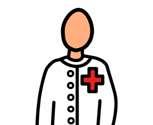
Youth Care Professional
Is someone who will make sure you are living in a safe, healthy, and nurturing environment.

Case Manager
Is someone who works with everyone to help reunite you with family or a sponsor as quickly as possible.

Teacher/Educators
Is someone who will work with you to help continue your education while you are with us.
Assistant Teacher


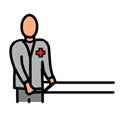
Is someone who works with the teacher and you to help you learn.



Recreational Therapist
Is someone who will plan fun activities on campus and in the community.
Other People
You will see other people that help care for you and the house. They are part of our team.
9
During Your Stay
Medical Services
You will have medical exams and check-ups to make sure you are healthy.
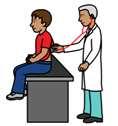
School
You will attend school for 6 hours every day from Monday-Friday.
Personal Items
You will receive items such as soap, shampoo, toothbrush and toothpaste.

Activities
You will participate in activities every day of the week.

Emotional Well-being
Groups and meetings with counselors will be available to you if you need.
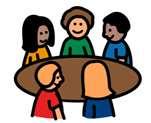
Religious Practices
The program will provide access to attend religious services when possible.
Phone Calls
You will be allowed to have at least 2 phone calls per week.
Mail Services
All safe mail, letters, and packages received are delivered to you. You are allowed to send mail to approved contacts.


Visitation
Approved contacts have the ability to schedule a visit with you during visitation hours.
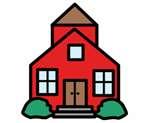


10
Meetings
There are several types of meetings you will need to attend while you are here. These meetings are to help us meet your needs during your time here and to plan to find your family or a potential sponsor for you to live with. Here is the list of meetings:
Case Management meetings:
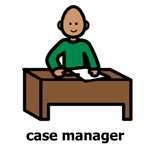
You will meet with their assigned Case Manager once a week.
Goal: to discuss reunification options and receive updates on the progress of your individual case.
Individual counseling meetings:
You will meet with a counselor for an individual counseling session once a week.

Goal: Address behaviors, concerns and progress in reference to your overall progress.
Group counseling meetings:

You will attend a group counseling session twice a week.
Goal: to teach all youth in the program how to manage behaviors, improve social skills and prepare for discharge from the program.

11
Meetings
Important
Daily Rules
Be safe, be respectful, be responsible!
Attend school every day when school is in session
Complete all assigned homework and ask for help, if needed
Follow the schedule for the day, as instructed
Attend all program activities:
Weekdays:
Physical activity: 1 hour

Recreational activity: 1 hour

Groups- if scheduled for the day

Weekends and non-school days:
Physical activity: 3 hours

Recreational activity: 3 hours
Complete all chores. See the daily chores checklist to help you make sure you get everything completed for the day
Daily Rules
12
Bedroom Rules
You will have either a single room or a shared room. You will have your own bed and a clean set of towels and sheets at your arrival.
Keep

Throw away my trash



Keep my things organized and in the place it belongs
Make my bed by tucking in my sheets, blankets, and fixing pillows
Fold my clothes and put them in my closet or cubbies
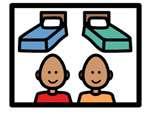


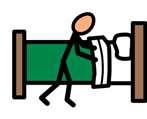
13
Respect my roommate’s belongings my bedroom door open In my room I…
Bathing and Personal Care
Maintaining good personal hygiene is an important part of maintaining good overall health. The program promotes and provides everything you will need for your personal care. Use the following hygiene checklist every day to maintain good hygiene.
Personal Care and Bathing Checklist:
Brush teeth 2-3x a day with toothpaste
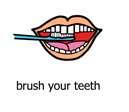
Before you shower, ask staff for a clean towel and washing supplies
Wash your hair with shampoo


Wash your entire body with soap:
o *Body
o *Arms & armpits

o *Legs & feet
o *Private areas
Dry your body with a clean towel
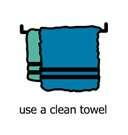
Put on clean clothes

Apply lotion

Apply deodorant

Comb/brush your hair

Return all washing supplies to your locker
Flush the toilet after every toilet use
Additional Personal Care:
Nail clippers are available to use at the nursing station
If you need a haircut, please let your staff know

14 Personal Care
Items Not Allowed
Weapons - knives, steel toe shoes, & toy weapons
Glass items- mirrors, nail polish, picture frames, bottled drinks, cologne
Metal items - thumbtacks, screws/nails, keys, bobby pins, paper clips, spiral notebooks, free weights, knitting/crochet needles, wire hangers, soda cans, padlocks
Cords & strings - drawstrings, hoodie strings, belts, electric blankets
Alcohol - including any hygiene products with alcohol listed in top 3 ingredients
Tobacco/cigarettes/E-cigarettes
Drug & paraphernalia
Matches & lighters
Cleaning products
Permanent markers
Metal/Wooden Bats & Golf Clubs
Devices with video/audio recording capabilities or internet accessincluding cell phones, laptops and MP3 players.
Items with inappropriate contentgang affiliation, sexual content, violence, drug/alcohol use, vulgar language
Media ratings –DVD’s and CD’s rated R. TV-MA, M, explicit content, nudity, crude humor, horror
Aerosol Cans – hairspray, deodorant, etc.
Ceramic items - mugs, plates, crafts, etc.
Magnets
Batteries
Backpacks, Suitcases, Purses - only used for passes or discharge
Skateboards, Scooters, Rollerblades
Items Allowed with Supervision
Items will remain locked at all times:
Razors & Electric Razor - cleaned between uses
Nail Clippers & Tweezers - cleaned between uses
Air Pump
Cooking Supplies
Yarn & Lanyard
Scissors- for projects, art/rec activities
Plastic Knitting & Crochet Needles
Curling Iron & Straightener - cleaned between uses. *Not allowed at UCS Texas.
Items that Must Be Checked-In and Checked-Out
Money & Gift Cards - kept in a locked safe; $20 limit. Staff will maintain possession of money during off grounds trips
Electronics - video game consoles, music devices, headphones, portable DVD players, tablets, book lights
Acne Wash - must be approved, stored, and distributed by Nursing
Allowed Items
Makeup –only items without mirrors
CDs & DVDs
Hygiene Items - shampoo, conditioner, soap, deodorant, toothpaste, toothbrush, hairbrush/comb/pick
Art Supplies
Sports Equipment
Musical Instruments
Food & Non-Caffeinated Beverages
Personal clothing Items (Well Fitting/Non-Torn)
o Jeans, shorts, pants, shirts, underwear, socks, sleepwear, jacket, sweatshirt, coats, swimwear, belt, shoes.
Stuffed animals, toys, photographs
15
Safety
The safety and security of every person is the program’s first priority.
Every person is entitled to live in a safe and comfortable environment.
The following checks and searches are done in order to keep the program a safe place for everyone:
Safety Checks
Staff may make safety checks regularly and unannounced. All common areas and rooms can be checked.



Room Searches
If we find something or believe you have a non-permitted item, staff members may go through your personal belongings.
Staff will take items that may be a safety risk to yourself or others

Emergency Drills
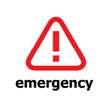

Upon arrival to the program, a staff member will show you where the nearest emergency exits are located and the safe meeting location outside of the building in the event of an emergency situation where evacuation is needed. A staff member will also show you where to go if you need to seek shelter in the program.
You are required to participate in all fire drills and workshops for fire and safety planning.

16
Healthy Boundaries
Our space should be a safe and comfortable space for everyone. Everyone must respect each other’s space and personal boundaries at all times.

Always practice healthy boundaries with staff and peers by following these guidelines:

Keep an arm’s length distance from others
Only give high fives, handshakes, or pats on the back

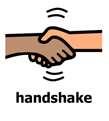

Keep bedroom doors open at all times
Respect someone’s request if they ask you to give them more space
Inappropriate Behavior
Examples of inappropriate behavior include:
Gets “too close” to others
Touches other people’s clothes, hair, body, or toys with or without asking
Hugs, kisses, or engages in sexual touching with others
Makes sexual comments to you or others
Makes others feel uncomfortable, confused, and awkward
Asks questions or makes comments about other people’s appearance or bodies

Entering another person’s room or bathroom
Writing and exchanging notes/letters to others with inappropriate comments or language
Exposing your body or someone else’s body to others
If someone is not practicing healthy boundaries and makes you or someone else feel uncomfortable, please report this to any staff immediately.
Trust your instincts. If it feels wrong, leave or call out for a staff It’s your right to say “NO,” “STOP IT,” or “DON’T TOUCH ME!”
17 Respect Everyone’s Boundaries
What to Do if You Have a Problem
If during your stay with us you have a disagreement or conflict with a staff member or another youth in the program, we encourage you to make an effort to sit down with this person and try to resolve it. If this does not work or you feel uncomfortable doing so, we encourage you to seek help through the process below.
How to report a problem?
If you encounter any concern about the staff, services, program policy, or become a victim or witness of abuse and/or neglect while with us, you may file a grievance according to the grievance process. A grievance can be submitted in writing or verbally as follows:
1. You can verbally tell any staff member to make a report of a grievance.
2. You may write your grievance on the grievance form located throughout the program and submit the report in a grievance box or to any staff member.
3. You can get help writing a grievance from a peer.

4. You can also get help to report your grievance from your family, your sponsor or your legal representative and that person can talk to the Case Manager or Clinician.
5. The program reviews all grievances on a daily basis.
6. The program will respond to the grievance within 5 days, unless the complaint requires additional investigation or reporting.
7. If your grievance is an emergency, the program will respond immediately.
If you feel that other children or staff are angry at you or trying to get back at you because of reporting a grievance, you may use the same method as detailed above to report retaliatory behavior as well. We
18
are here to help you!
Important Resources and Phone Numbers
If you or someone else is in immediate danger or in a life-threatening medical emergency, pick up any phone and dial 9-1-1. Only call 9-1-1 in very serious situations.
Calling 9-1-1 will connect you to an operator that can help you by:
Send the police for help
Send the fire department to help with fires and other emergencies
Send an ambulance to help you with a medical emergency
1-800-203-7001
ORR National Call Center
The ORR National Call Center can help if:
If you experience any of the following, we are here to help:
Someone is hurting you or making you feel bad or scared
You have trouble finding help
You are feeling sad or unwanted
Someone is keeping you away from food, shelter, school, or medicine
You are having family problems
You are having difficulty with court
You don’t feel safe and happy
Kids are being mean to you at school
You are angry or hurting
You have nowhere to sleep

You have trouble finding your paperwork
Someone is forcing you to do something that makes you feel uncomfortable
Someone is touching you in a way you don’t like, or someone makes you do things that make you uncomfortable
19
I F YOU N E E D H E L P , C A L L:
HELP
1-855-232-5393
UAC Sexual Abuse Hotline

Call the UAC Sexual Abuse Hotline if:
You have been a victim or witness, or if you think there is sexual abuse or sexual harassment that is occurring or has occurred at a care provider operating on the behalf of ORR.
The Hotline directly connects you to a live representative who is bilingual in English and Spanish and who understands how to interview youth. You may also call anonymously, meaning you don’t have to give your name or other identifying information.
20 I F YOU N E E D H E L P , C A L L:
HELP
Legal Services for Unaccompanied Children
While you are at the Devereux Unaccompanied Children’s Services program you will be provided pro bono legal services from the organization listed below. You will be assigned an attorney and provided with their information for you to contact if you have questions or concerns about your legal case.
Connecticut Institute for Refugees and Immigrants (CIRI)
670 Clinton Avenue
Bridgeport, CT 06605
Contact:
Susan Schnitzer Director, Programs and Compliance
Website: www.cirict.org
21
Welcome Book Acknowledgement
Name: A#: __________________________
Program: ____________________ Admission date: ________________
I acknowledge that I received the Welcome Book, which includes information on the following topics:
Program Description
Program Services
Staff Roles
My Rights
Program Rules
Safety Guidelines
Procedure if there is a Problem
Important Resources and Phone Numbers
I acknowledge that the Welcome Book has been reviewed and explained to me in full. I have read this statement and the staff have answered all of my questions. I understand and agree to comply with the terms and conditions described in this handbook.
Youth Signature
Date
Witness Signature Date
Please remove this page from the Orientation Packet and assure it is placed in the Client’s Case File
22




























































